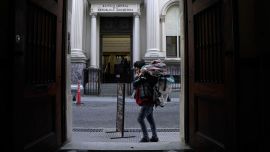Argentina’s Central Bank is in talks with private lenders about adding a put option to its local bonds that would compel the monetary authority to buy back the notes if prices fall too far.
Technical staff from private banks met Monday with the Central Bank’s general manager, Agustin Torcassi, to discuss the possibility, according to people with direct knowledge of the matter.
A put option is a financial instrument that allows the holder to sell the security at a set level, even if market prices fall below that level.
In the plan under discussion, the Central Bank would be the counterparty for the option, according to the people, who asked not to be identified discussing confidential meetings. The contract would have a two-percent annual cost to the banks that purchase them.
The proposal highlights how difficult it has become for Argentina to raise funds via its local markets amid jitters about the country’s ability to repay its debt and concerns the peso could be devalued. Investors are keeping a close eye on rollovers on the government’s growing local debt pile, with significant concerns that a local bond restructuring is becoming all but inevitable.
The Economy Ministry declined to comment while a Central Bank spokesman and a representative from the two main bank associations did not immediately respond to requests for comment.
In a radio interview Tuesday morning, Central Bank Governor Miguel Pesce said that the entity will intervene as needed to support the price of Treasury bills and that it will “reinforce its signalling to markets with some decisions that will be taken this week.”
In the meeting, the officials also discussed reducing the maturity of the Treasury bonds that banks can could as reserve requirements to 90 days from 120 days.
The Economy Ministry announced late Monday that on Wednesday it will sell local notes and bonds as it seeks to roll over almost nine billion pesos (US$71 million) coming due. The government will have to face a much larger maturity of about 500 billion pesos at the end of the month.
by Ignacio Olivera Doll, Bloomberg



















Comments